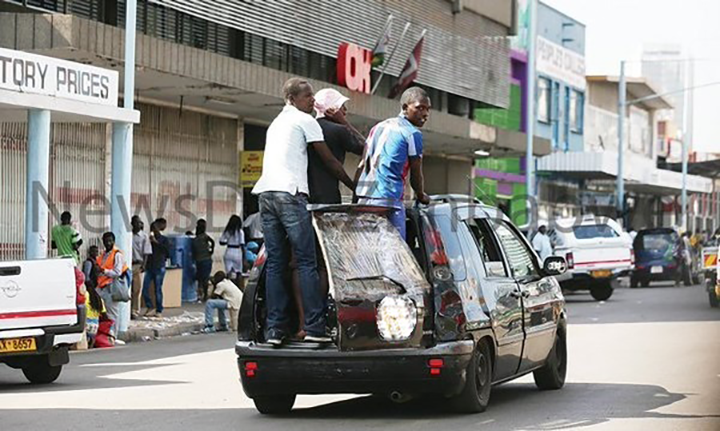
THE recent horrific rape of a 13-year-old girl at Rezende Parkade in Harare has finally forced authorities to confront a long-festering crisis that has plagued Zimbabwe’s public transport system.
However, this incident, while shocking, merely represents the tip of an iceberg of violence, harassment and lawlessness that has become normalised in our transport hubs.
As Zanu PF Women’s Quota representative Getrude Mutandi eloquently articulated in Parliament, our bus ranks have devolved into “breeding grounds for criminality and gender-based violence”.
The chaos at major terminals like Mbare, Roadport, Showground, Dangamvura and Old Renkini isn’t merely a law enforcement issue — it is a profound social crisis that reflects broader systemic failures in urban planning, economic management and public safety infrastructure.
The current situation, where touts operate with impunity, enforcing arbitrary fees and unleashing terror on commuters, stems from years of regulatory neglect and the collapse of formal public transport systems.
The void created by the decline of organised transport services has been filled by a parallel system where might makes right, and vulnerable commuters, especially women, children and the elderly, bear the brunt of this dysfunction.
Looking at successful international models provides a roadmap for reform.
Kenya’s implementation of the “Michuki Rules” in its matatu industry demonstrates how strict regulation can transform a chaotic transport sector.
- Vieira backs Mane for Ballon d’Or ahead of Bayern move
- ICT boon: The case of vulnerable children during Covid-19 pandemic
- Corruption watch: Time for citizens, civil society to take over
- Corruption watch: Quarry dust is choking Mutare
Keep Reading
These rules mandated vehicle standards, driver certification and conductor registration, leading to significant improvements in passenger safety and service quality.
Similarly, Rwanda’s transformation of its public transport sector through digital payment systems, professional driver training and strict enforcement of regulations offers vital lessons.
Tanzania’s “Daladalas” system provides another instructive example, where route associations work closely with municipal authorities to maintain order and safety.
Their implementation of designated stops, official fare structures and a formal complaint mechanism has significantly reduced passenger harassment and fare disputes.
As such, Zimbabwe needs a comprehensive reform strategy that goes beyond simple registration and uniforms.
In this regard, we must establish a National Public Transport Authority with enforcement powers and a mandate to oversee the complete overhaul of the sector.
This body co-ordinates local authorities, law enforcement and transport operators to implement and maintain standards.
Registration of touts must be part of a broader professionalisation of the sector.
This should include mandatory training in customer service, conflict resolution and passenger rights.
Regular psychological evaluations and drug testing should be mandatory, with clear consequences for violations.
The uniform system should incorporate smart technology — ID cards with QR codes that passengers can scan to verify tout legitimacy and report misconduct instantly.
Additionally, technology must be leveraged on more extensively.
Beyond CCTV cameras, we need a comprehensive digital infrastructure that includes electronic ticketing systems, real-time vehicle tracking and an integrated passenger safety app.
This app will allow immediate distress signalling, track journey routes and provide direct lines to transport police and emergency services.
The proposed rank committees should be expanded into Transport Safety Councils, comprising representatives from women’s groups, disability advocates, law enforcement, local businesses and community leaders.
These councils will have real power to revoke tout licences, impose fines and recommend criminal prosecution where necessary.
Further to that, law enforcement requires complete restructuring.
A specialised Transport Police Unit, trained in community policing and gender-sensitive law enforcement, should be established at every major terminal.
These officers need proper resources, including body cameras and rapid response vehicles, and must be held to strict performance standards.
The underlying economic factors cannot be ignored.
Many touts turn to harassment and extortion because of economic desperation.
A formalisation programme must include decent wages, benefits and clear career progression paths.
This could include opportunities for touts to transition into formal roles as bus conductors, drivers or transport managers through certified training programmes.
Infrastructural development is also crucial.
Modern terminals with proper lighting, secure waiting areas, separate facilities for vulnerable passengers and professional security systems must be built.
These should include child-care facilities, allowing working mothers to travel more safely with their children.
Public education and community engagement must be ongoing.
Regular safety awareness campaigns, self-defence training for women and girls, and community feedback sessions should be institutionalised.
Schools should incorporate transport safety into their curriculum, teaching children how to travel safely and report abuse.
The tragic incident at Rezende Parkade could have been prevented if these measures had been in place.
As civil society organisations have pointed out in their recent petition, government’s piecemeal approach to tout regulation has failed to address the root causes of the problem.
The time for incremental changes has passed.
Japan’s public transport system, renowned for its safety and efficiency, took decades to develop, but began with a clear vision and unwavering commitment to passenger safety.
Zimbabwe must show similar dedication to transforming its transport sector.
This requires sustained political will, substantial financial investment and a fundamental shift in how we view public transport — not as a necessary evil but as a critical public service that reflects our values as a nation.
The solution must be as comprehensive as the problem is complex.
Every day we delay implementing these reforms, we put more lives at risk.
The public’s right to safe, dignified transport cannot be negotiated or compromised.
The transformation of our transport sector must begin now, with clear timelines, measurable outcomes and absolute accountability for failure to deliver.
Our citizens, particularly our women and children, cannot afford to wait any longer for the safety and dignity they deserve.
- Lawrence Makamanzi is an independent researcher and analyst, passionately sharing his insights in a personal capacity. He is reachable at blmakamanzi@gmail.com or 0784318605.










